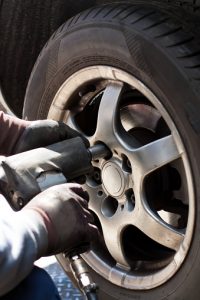 An accident caused by a loose wheel is rare, but they can happen unexpectedly and impact more than just the driver when they do. Crashes caused by wheels coming off vehicles are commonly referred to as wheel runoff crashes, according to crashforensics.com.
An accident caused by a loose wheel is rare, but they can happen unexpectedly and impact more than just the driver when they do. Crashes caused by wheels coming off vehicles are commonly referred to as wheel runoff crashes, according to crashforensics.com.
Primary causes of wheel runoffs
Two primary failures cause wheel runoff crashes. One is a failure of the wheel mounting system, such as the wheel studs, lug nuts, etc. The other is a failure of the hub and wheel bearing assembly. Most commonly, these failures are related to improper or deferred maintenance, but some are also linked to manufacturer's defects.
Improper installation of a wheel can cause it to become loose. That can lead to the wheel studs breaking and the wheel and tire separating from the vehicle. Torque refers to the twisting force applied to an object, in this case, the pressure used to attach lug nuts to mount the wheel on the vehicle.
Over-torqueing is likely the most common wheel system failure due to the widespread use of ‘impact wrenches’ to install wheels. Using an impact wrench to install wheels commonly causes the wheels to have three to five times the specified lug nut torque. An impact wrench is a power tool that can bear two to five times more torque in the installation of vehicles’ lug nuts than regular wrenches and lead to wheel system failures.
Under-torqueing, of course, refers to a failure to tighten the lug nuts enough that causes the wheel to be loose.
Wheel torque installation requirements vary from vehicle to vehicle. One-hundred-foot pounds of torque are required to install lug nuts on most passenger vehicles. That jumps to 400-foot-pounds of torque for the attachment of lug nuts on big trucks.
A wheel mounting system is a bolted joint, which means it works by clamping two surfaces together. The friction of the two surfaces and the force established from clamping them together with bolts — which is known as the clamp load — allows the two surfaces to resist movement.
The amount of friction and clamp load determines the level of resistance the joint has to movement. Items like rust and lubrication on the threads of a bolt can affect the clamp load. “Yield Point’ is when the bolt has been stretched past its elastic limit and can no longer spring back to its original shape.
Other issues related to wheel runoff accidents are excessive wheel paint thickness, lack of lubrication, overloading the vehicle and installing the axle nut too tightly or too loosely.
Szantho Law Firm of Albuquerque is experienced in all issues related to wheel runoff accidents. Contact us today for legal help.
